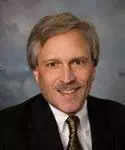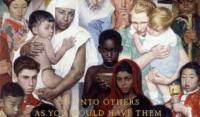I'm concerned about our society’s ills and their impact on individual relationships, yet wonder…How can we set things straight again?

It seems so many facets of our society are coming apart all at once – mass shootings, rejection of democratic norms, mean-spirited elected leaders, declining religious participation, lackluster schools, a cooling economy, rising prices, and a power imbalance between capital and labor. Like many others, I find myself wondering “How can we set things straight again?” This holiday season, I began to look for an answer to that question.
Society’s Ills Amplify Division and Selfishness
The items I listed affect society as a whole. While these ills ultimately trace back to poor behavior by groups of individuals, they also trickle down to people beyond the original groups and lead to yet more poor behavior, including feuding within families and between friends, even tearing apart long-time relationships.
In October 2018, David Brooks wrote an opinion piece with the premise that “the chief struggle of the day is sociological and psychological, not ideological or economic. The substrate layer of American society – the network of relationships and connection and trust that everything else relies upon – is failing.” The result? Division and disconnection proliferate.
Last month, Jamelle Bouie began an opinion column by listing numerous mean-spirited comments by prominent politicians about the brutal attack on Paul Pelosi, the husband of Speaker of the House Nancy Pelosi. He then quickly pivoted to an analysis of several fundamental aspects of our national government, and shared how his views evolved from believing institutions mattered more than virtue – where virtue means the “willingness to get along with others for the sake of peace and prosperity” – to seeing both institutions and virtue as co-equal foundations for an effective society. Without both? Selfishness and nastiness abound.
How might we begin to repair today’s division and selfishness, both individually and collectively?
Ethics 101
In 2003, successful pastor turned leadership teacher and author John C. Maxwell published a wonderful little book, Ethics 101: What Every Leader Needs to Know. The only quibble I have with the book is its subtitle because, just like the teachings it contains, this is not just a book for leaders – it's a book for everyone. Early on, the author shares the thesis of Ethics 101:
“Asking the question, ‘How would I like to be treated in this situation?’ is an integrity guideline for any situation.”
You might recognize this question as a rephrasing of the Golden Rule, familiar to many from the teachings of Jesus. Yet the Golden Rule actually predates Jesus by at least several hundred years, and is an almost universal ethical standard, being found in numerous faith traditions including Islam, Judaism, Buddhism, Zoroastrianism, and Jainism. What makes the Golden Rule so powerful is its simplicity – even a young child can understand this ethical standard:
“Do unto others as you would have them do unto you."
Even though the Golden Rule is simple, it is useless unless someone has the will to follow it. To me, the root cause of all the issues listed earlier is that a large number of people, across all parts of society, have lost the will to behave ethically and follow the Golden Rule.
Scaling Up the Golden Rule
In my opinion, we could readily change society for the better if more people followed the Golden Rule. The question really seems to be this – How might we introduce, or reintroduce, the Golden Rule to the large number of people not currently practicing it? Perhaps one way is to invite such folks to take part in a service project with you. I've personally seen and heard many examples of hearts being softened and attitudes being changed after someone prepares and serves a meal at Greensboro Urban Ministry (GUM) – so let me share two, showing how the Golden Rule affected both the doer and the recipient.
One fellow long-time volunteer at GUM once told me about a friend of his who held certain negative assumptions about homeless persons. This man’s views were completely changed when he volunteered at a GUM Winter Emergency Shelter hosted at his congregation’s facilities. Only by serving those he’d previously shunned did this man have his misconceptions shattered, coming to see the dignity and decency of his congregation's guests.
Many years ago, I was sweeping the dining room floor at GUM and began chatting with a pleasant young man. Here's what he told me – "You know, as a Black person, the world frequently puts me down, just because of the color of my skin. Yet, in here, what you volunteers do is treat us like kings and queens! And we really need that! So, THANK YOU very much for your service and respect – and, never forget, you ARE making a difference in our lives!"
Extending kindness and respect to a person currently experiencing homelessness is a perfect example of living out the Golden Rule. Consider how you would feel if you had the misfortune to lose your home and had no choice but to move into a night shelter. Would you prefer to be treated with kindness and respect, or with ridicule and disdain?
Could putting the “Golden Rule” into action more consistently remind people of our shared humanity, and begin to repair broken relationships and frayed institutions? The way I see it, poor behaviors ripped these apart, so good behaviors can weave them back together.
So, this holiday season, let me extend an open invitation to anyone who needs to brush up on the Golden Rule, or who knows someone who does. Any Friday morning at 6 am, join me and my friends at Greensboro Urban Ministry where you will be warmly welcomed to help serve "The Least of These."
Peace, Shalom, Salaam, Namaste,

Todd L. Herman






